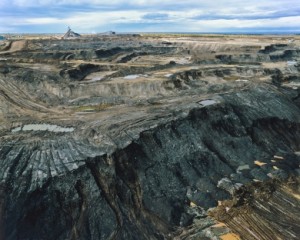Worldlog Tjedan 42 – 2013
Konačno se poduzimaju mjere da se uvoz nafte katranskog pijeska zaustavi. Naša se vlada mora iskazati u Bruxellesu kako bi se izglasala zabrana uvoza u Europu.
Mi se već duže vrijeme borimo da se poduzmu mjere protiv ove vrste goriva, jer je usko povezano s razaranjem prirode u velikim razmjerima i trgovanjem zemljom (tzv. „land grabbing“, op.prev.). Nafta katranskog pijeska uglavnom dolazi iz Kanade čiji ekosistem već osjeća teške posljedice. Za potrebe iskapanja katranskog pijeska sijeću se ogromne površine šuma, te se zagađuju zemlja i vode.
Nafta katranskog pijeska daleko je štetnija za okoliš zbog veće količine ugljičnog dioksida kojeg oslobađa pri izgaranju. Osim toga, njegovo vađenje uništava životni prostor zajednica First Nation starosjedioca. Ljudi bivaju protjerani sa svoje zemlje i obolijevaju od posljedica konzumacije teških metala i kemikalija koji su se uvukli u cijeli prehrambeni lanac. Ovo je zagađenje dovelo do ekstremnog porasta broja oboljenih od karcinoma unutar lokalnog stanovništva.
Nizozemske novine Trouw svake godine objavljuju top 100 listu najutjecajnijih Nizozemaca na području dugotrajnog očuvanja . Mi smo, kao jedina frakcija Donjeg doma, svi na listi! Našla sam se na 18. mjestu zbog svoje razmjerno uspješne borbe protiv rasprodaje prirode koju je pokrenula organizacija Staatsbosbeheer (Državna uprava za šumarstvo, op.prev.). Prošle smo godine u travnju, u samo dva tjedna, preko ‘woudfunding-campagne’ (kampanje za prikupljanje sredstva za šume, op.prev.) na našoj web stranici skupili oko 250 milijuna eura, kako bismo otkupili najugroženija prirodna područja. Državna uprava za šumarstvo mora, naime, uštedjeti nešto novca i to namjerava postići prodajom zelenih površina Nizozemske najboljem ponuditelju. Taj bi najbolji ponuditelji mogao biti i netko sa sasvim drugim planovima za zelene površine. Tokom dražbe uspjeli smo otkupiti gotovo 100.000 m² prirode! Rasprodaja drugih prirodnih područja zasad je, na sreću, odgođena.
Moja je kolegica Esther također našla mjesto u Trouw-ovom top 100 zahvaljujući svojoj borbi protiv ilegalnog odlaganja ribe i zato što ‘zagorčava život tvronicama pesticida’. Mi ćemo, naravno, nastaviti s našom borbom protiv svih gnjusnih planova koji ugrožavaju našu planetu!
Danas (ponedjeljak, 14. listopada) sam nastavila razgovor s rumunjskim ambasadorom o novom rumunjskom zakonu koji dozvoljava nasumično hvatanje pasa lutalica, njihovo premlaćivanje, trovanje ili izgladnjivanje u azilima. Rumunjski je Ustavni sud 25. rujna odlučio podržati zakon. Međutim, ovaj rumunjski zakon negira nekoliko europskih dogovora. Dvadesetog sam rujna također posjetila ambasadora. Izvještaj tog razgovora nalazi se u mom Worldlogu 39. tjedna. Idućeg tjedna više informacija o drugom razgovoru!
Gotovo 500.000 hektara prirode na prekrasnim otocima Aru kod Indonezije moglo bi biti uništeno zbog neobuzdane sadnje plantaža sećerne trske multinacionalnih kompanija. Pomozi i podrži protest lokalnog stanovništva.
Danas za kraj, jedan divan citat svjetski poznate ekologinje Rachel Carson: „We cannot have peace among men whose hearts find delight in killing any living creature.“
Lijep pozdrav, Marianne
Finally, measures are taken to curb the import of highly polluting tar sand oil! Our government will have to advocate in Brussels for a European import ban.
We have been pressing for measures against this fuel for some time as its extraction entails large-scale nature destruction and land grabbing. Tar sand oil mainly comes from Canada and is a severe attack on the ecosystems there. To be able to dig up the tar sands, forests are cut down and water and soil get polluted on a large scale.
In addition, due to its high CO2 emissions, tar sand oil is even more damaging to the climate than other fuels. On top of that, the oil extraction is destroying the habitats of native First Nations communities. People are expelled from their land and the heavy metals and chemicals that are everywhere in their food make them ill. This pollution causes an extremely high number of cancer cases among the local population.
Every year, the Dutch newspaper Trouw publishes a “Sustainable Top 100” of the most influential Dutch people in the area of sustainability. We are the only full parliamentary group of the Lower House listed! I was listed as no. 18 because of our successful fight against the selling of nature by nature organisation Staatsbosbeheer (Dutch National Forest Service). Through a ‘forest funding campaign’ last April, one quarter of a million Euros was raised through our website in two weeks’ time to buy the most vulnerable nature. Staatsbosbeheer needs to cut back and they want to do so by selling several pieces of nature in the Netherlands to the highest bidder. But the highest bidder could also be someone who would change the nature into something completely different. During the action we managed to buy almost 100,000 m2 of nature! The selling of more nature areas was fortunately suspended for now.
My colleague Esther was listed in the Top 100 by Trouw because of her fight against the illegal dumping of fish and because she made the ‘life of pesticides manufacturers difficult’. We will of course continue our fight against all ill-fated plans that will further endanger our planet earth.
Today (Monday the 14th of October), I will have a follow-up meeting with the ambassador of Romania about the new Romanian law that makes it possible to catch stray dogs at random, or to kill them by poison, hit them to death, or starve them in shelters. The Romanian Constitutional Court ruled in favour of the law on the 25th of September last. But this Romanian law ignores a number of European agreements. I also met the ambassador on the 20th of September last. The minutes of what was discussed on the 20th can be found in my Worldlog of week 39. Next week I will tell you more about the second meeting.
500.000 hectares of nature on the beautiful Aru Islands (near Indonesia) is threatened to be swallowed by sugar cane plantations of multinationals. Help and support the protest of the local population.
To finish off with, here is the wonderful statement of the world famous ecologist Rachel Carson: “We cannot have peace among men whose hearts find delight in killing any living creature.”
Greetings, Marianne
